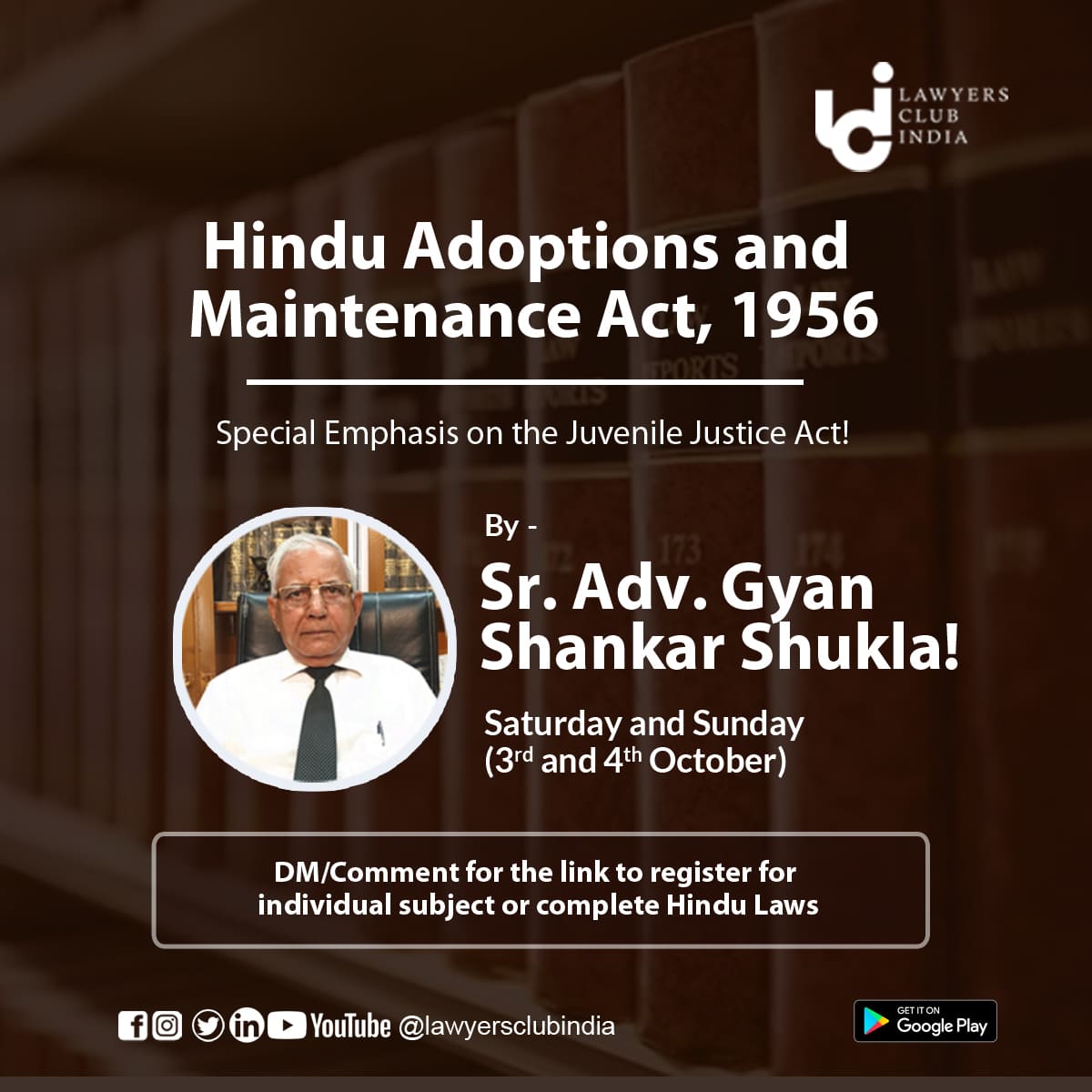Bench:
- Bhargava
- Vishishtha
Issue:
Whether adoption by a widow will be the deemed son of her deceased husband as well?
Facts:
• A widow, whose husband had died before the Hindu SuccessionAct came into force, adopted respondent 2 after theenforcementof the Act. At the time of the husband’s death, he was an owner of some land and a house.
• Smt. Bhagwani, a widow, adopted respondent No. 2 Deep Chand, the son of Brahmanand and his wife Smt. Kala Wanti.
• A deed of adoption was executed by her in that respect on August 24th, 1959.
• On the widow's death, which was on 31st October 1959, the appellantthe nearest reversioner of her husband, filed asuitchallenging the adoption.
• Sawan Ram, who claimed to be the nearest reversioner of Ramji Dass, the husband of Smt. Bhagwani, brought a suit for the possession of the land gifted by Smt.

Enroll the Complete MasterClass Course on Hindu Laws: Click Here
Appellant's Contentions:
• The first point taken is that, even though the appellant did not challenge the finding of fact that respondent No. 2 was, in fact, adopted by Smt. Bhagwani, that adoption was invalid under clause (1) of section 6 read with sub-s. (2) of s. 9 of the Hindu Adoptions and Maintenance Act, 1956 (No. 78 of 1956) (hereinafter referred to as "the Act"). It is urged that, under s. 9 (2) of the Act, if the father of a child is alive, he alone has the right to give in adoption, though the right is not to be exercised, save with the consent of the mother. In this case, reliance was placed on the language of the deed of adoption dated 14th August, 1959, to urge that Deep Chand was, in fact, given in adoption to Smt. Bhagwani by his mother, respondent No. 1, even though his father, Brahmanand, was alive.
• The deed of adoptionmentions that they had been given in adoption by his "Parentswhich necessarily includes the father. The followingsentence stating that the mother of the boy had 'put herthumb-mark hereunderin token of her consent,'was put inthe deed, because s. 9(2) of the Adoptions and MaintenanceAct mentions that the father is not to exercise his right ofgivinghis child in adoption, save with the consent of themother.
Respondent's Contentions:
• The provision in s. 12 of the Act, makes it clear that,on adoption by a Hindu femalewho has been married, theadopted son will, in effect, be the adopted son of herhusband also.
• Under the Shastric Law if a child was adopted by a widow, he was treated as anatural-bornchildand,consequently, he could divest other members of the family of rightsvested in them prior to his adoption.
Judgement:
The adoption of Deep Chand was challenged as fictitious and ineffective. It was further urged that even if the adoption was valid, Deep Chand became the adopted son of Smt. Bhagwani and could not succeed to the properties of Ramji Dass. The appellant argued that the adoption of respondent No. 2 by Smt. Bhagwani was invalid under Section 6(ii) read with Section 9(2) of the Hindu Adoptions and Maintenance Act, 1956. Under Section 9(2), if the father of the child is alive, he alone has the right to give in adoption, though the right is not exercised, save with the consent of the mother. It was urged that Deep Chand was given in adoption to Smt. Bhagwani by his mother even though his father was still alive.
The Court held that Deep Chand was given in adoption by both the parents to Smt. Bhagwani. The deed clearly mentions that Deep Chand was given in adoption by his “parents” which necessarily included the father. The draftsmen of the deed included in it the fact that Deep Chand’s mother had actually given her consent and obtained her thumb-impression in token thereof. This mention of the consent cannot be held to show that it was the mother who gave the child in adoption and not the father.
It was urged that the scheme of the Act is that, when a Hindu female adopts a child, he becomes the adopted son of the Hindu female only and does not necessarily become the son of the deceased husband, if the Hindu female be a widow. Under Section 5(1), the adoption to be made is mentioned as “by or to a Hindu”. Adoption to a Hindu was intended to cover cases where an adoption is by one person, while the child adopted becomes the adopted son of another person also. In a case like the one under consideration, the actual adoption would be by the female Hindu, while adoption will be not only to herself, but also to her husband who is dead.
Relevant Paragraph:
On adoption by a widow, the adopted son is to be deemed to be a member of the family of the deceased husband of the widow. He loses all his rights in the family of his birth and those rights are replaced by the rights created by the adoption in the adoptive family. This provision in Section 12 of the Act itself makes clear that on adoption by a Hindu female who has been married, the adopted son in effect will be the adopted son of her husband also.
Appeal dismissed. A child adopted by a widow will be deemed to be the adopted son of her deceased husband.









